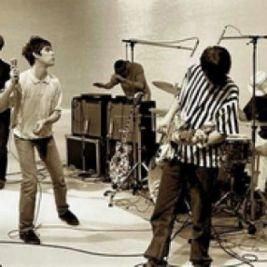
Classics revisited: The Stone Roses - The Stone Roses
The Stone Roses released their cult, self-titled, debut album in 1989, the record defined a generation and inspired many to come, so we discuss what makes the lemon-scented album so great.
Skiddle Staff
Date published: 2nd Sep 2022
In the years leading up to the debut record of The Stone Roses, the atmosphere of the country was an oscillatory one. The acid house craze dominated UK popular culture, and the establishment, spearheaded by Margret Thatcher, were in ardent opposition to the working-class movements. The craze was underpinned by Thatcher's cuts to jobs and her domineering stance over the unions. It caused, what can only be described as a desire amongst those affected for more. For an identity, a culture, a movement that was tethered from Governmental control.
Such a climate wasn't ready for The Stone Roses' debut, a record which by all accounts was against the grain of not only their contemporaries but the climate that the upper echelons of society at the time wanted, and upon release, it was almost universally adored.
The four ‘scallies’ from the streets of Manchester that made up the band had been intertwined in the cultural movements of the 80s, they had been Perry Boys, Soulies, and Scooterboys, they had raved in the Hacienda, danced away to the Happy Mondays, and seen New Order rise out of the ashes of Joy Division.
They had been a part of everything the Government had been against, and what followed was a record infused with a melting pot of influences both politically and musically, making for a sound and swagger that resonated.
It was, however, despite being a foundational record of outstanding quality, the start of a short career for the band. Whilst their follow-up ‘Second Coming’ came years too late, it definitely isn’t as awful as many fans will have you believe. But it meant the band had crafted a unique formula, only to never expanded upon it.
To many fans, The Stone Roses' debut is as much a nostalgia trip to the times of baggy jeans and ecstasy in fields, as it is a piece of music, a hark back to the youth, and the sounds that promised so much.
But what followed doesn't have to mar what came before, from the first note of ‘I Wanna Be Adored’ shivers tingle your spin. The atmospheric, goth-inspired, opener is a constant crescendo of interlaced musical wizardry. From Squires's tingling solo lines to Mani’s crunching bass to the dissonant musing from Brown, it comes together superbly. It's a rare piece of music, particularly for the time, that despite having barely more than a dozen words, encapsulated its sentiment perfectly.
The production by John Leckie, who had worked with the likes of Lennon and McCartney's solo work to later Pink Floyd to XTC, gave the band the stability to experiment. It gives the record an undeniable edge, feeling slightly improvisational and rough around the edges at times. It's a feeling that is very much absent from modern music, with more and more push to perfectly crisp tones and production that rings out clean every time, but it's one of the things that makes this record shine.
Such experimentation is paramount on ‘Waterfall’ and ‘Don't Stop.’ ‘Waterfall’ is a psychedelic delight that merges the dance of the time with the psych of yesterday, all over poetry from the ‘godlike genius’ this is Ian Brown. But ‘Don't Stop’ is a requisite to this untethered notion of experimentation, with the track being the musical body of ‘Waterfall’ reversed. Many may see it as self-indulgent, and whilst that may be, it is really a stroke of genius, and the record wouldn't be the same without it
The record ebbs and flows between tracks that would undoubtedly still perform well today. ‘She Bangs The Drums’ is a jangling ode to 60s pop, with smatterings of The Kinks, making it out of line with the atmosphere of late 80s manchester, but still oddly resonant with the aspirational goals of working-class Britain. ‘Shoot You Down’ is an incredibly underrated number, that's reserved manner and floaty riffs ironically make it stand out. ‘This Is The One’ has a real goosebump factor, getting bigger and bigger as the track goes on, a soundtrack of hopeful endeavour and anthemic size. Not bad for a track about going after the elusive dream girl.
But it's the final track ‘I Am The Resurrection’ that stands out. Ambitious, self-assured, bordering on prog rock in the close and many, many fans’ favourite tune. There are few better closers to an album than the impeccably drawn-out instrumental jamming, and we challenge anybody to listen without screaming out the seminal line of ‘I am the resurrection and I am the light’ when listening. It was the song of a band with swagger, the embodiment of the baggy era, and was, what many people thought at the time, a clear signpost of what would be a long and illustrious musical career, from local lads to global superstars.
Yet, it never came to be. But, on this cult debut album, Ian Brown, John Squire, Gary ‘Mani’ Manfield, and Alan ‘Reni’ Wren captured the vibe of the era. By combining the psychedelic and hippy rock of the past, with the burgeoning Acid Hosue movement of their present, they crafted a sound that may not have been entirely original, but was most definitely authentic, and was steeped in a self-assured arrogance that would go on to pepper bands like Oasis that followed.
Whilst the paint they threw all over their record label offices may have taken time to shift, the legacy of this record is unshiftable, immutable and has been seen throughout music ever since.
Check out our What's On Guide to discover even more rowdy raves and sweaty gigs taking place over the coming weeks and months. For festivals, lifestyle events and more, head on over to our Things To Do page or be inspired by the event selections on our Inspire Me page.
Read more news






























